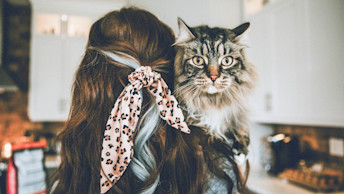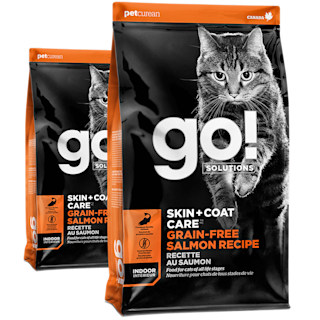July 12, 2021
Adopting a Senior Cat: What to Expect

Are you looking into adopting a new furry friend for your home? When most people visit the shelter, they gravitate towards the kittens. They're small, fluffy, and brand new to the world, but what about the senior pets?
Adopting a senior cat isn't something that everyone is up for. When you get this pet, you know that you'll have less time with it than you would a younger cat or kitten. This is hard for some people.
With that in mind, senior cats still need homes, and they have a lot of love to give. If you're ready for the challenge, caring for senior cats is fulfilling and rewarding.
Not sure if it's right for you? Keep reading to learn all about what to expect when you adopt a senior cat.
Supplies: Getting Your Space Ready
As you would with any new pet, you want to make sure that your home is ready for your furry friend. All cats require similar supplies, so this is a fun and simple process.
Make sure that you have a safe and quiet place to put a litter box. If you have a cat already, it's a good idea to get a second litter box. While cats that are raised together can sometimes share, you don't want to worry about any territory problems with this new cat.
If you have a dog or other un-caged pet, make sure that the litter box is somewhere that they can't access so the cat can feel secure.
You'll need a new food bowl, even if you have another cat.
While this cat is older, it's a good idea to have some toys around. These cats will likely be less energetic, but that doesn't mean that they won't want to play. You also want to invest in a scratching post if your cat still has claws (unfortunately, many senior cats were declawed by former owners).
Keep in mind that your new friend might want privacy when you bring it home, so find a place that it can rest until it's comfortable joining the rest of the family.
Gaining Trust
When it comes to caring for senior cats, you'll generally know their personality right away. They're old enough to have solidified their personalities in their previous homes.
Even a cat that's very affectionate in the shelter may need time to learn to trust you. Many senior cats were in previous environments that weren't safe or comfortable, so they could be skittish.
Some cats have anxiety around children, men, or other pets due to their previous experiences. Keep this in mind before you adopt your pet so you don't cause the cat any stress.
When it comes to gaining trust, try not to put pressure on the cat. Let it come to you and don't get aggressive about playing or petting right away. Be gentle and let the cat lead the show.
Health Needs
Senior cats are often quite healthy, but because they're older, their health problems will arrive more quickly than you'd expect with a kitten.
Cats are often spry and healthy well into old age, but you may start to notice symptoms of certain conditions. Make sure that you have a vet before you adopt the cat so you always have someone to turn to.
Older cats are prone to gum disease, though this is avoidable. Make sure that you visit the vet for cleanings or learn to clean your cat's teeth on your own.
Common diseases for older cats include heart disease, kidney disease, and lung disease. Older cats may also develop hormonal conditions such as hypothyroidism (which may present as fatigue and weight gain).
Your cat may develop arthritis, making it less spry than it was before. Remember that this is normal, but see a vet to make sure that the cat isn't in pain. Vets can prescribe medication for all senior cat needs.
Nutritional Needs: Is There a Difference?
Speaking of health, older cats have special nutritional needs.
Older cats are also prone to obesity. Because they aren't playing as much as they were when they were little, and because of the cushy life that being a housecat provides, they put on weight.
Indoor cats in general struggle with weight loss, so it's important to look into foods formulated for indoor cats, like the Go! Solutions Skin + Coat Care Grain-Free Salmon Recipe. This recipe contains omega fatty acids to promote skin and coat health + help control shedding as well as probiotics and prebiotic fibre for healthy gut bacteria and digestion. You want to make sure that the food is easily digestible to cater to their aging stomachs. These foods are nutritionally balanced to make sure that your cat stays healthy and fit for as long as possible!

Recommended Solution
Expert Solutions for healthy skin and shiny coats
This delicious recipe helps control shedding and supports healthy skin and coats, with added fruit and veggies to support your feline friend’s immune function, and pre and probiotic fibre for healthy digestion.
View product details
Your pet deserves a tasty and healthy diet just like you.
Senior Cat Care
Senior cats may have different care needs, though this depends on the cat, its history, and its overall health.
Cats tend to age well, so you don't have to worry too much about specific intensive care as long as the cat is healthy. When your cat's health starts to decline, start seeing the veterinarian more often so you can keep the cat comfortable.
Older cats tend to sleep more than younger cats, and they may enjoy cuddling up. Don't force it, but let the cat come to you.
Make sure that you have plenty of drinking water available for your cat. Cats are prone to dehydration. Keeping wet food available as well will help with that problem.
Adopting a Senior Cat: Are You Up for It?
Adopting a senior cat might be the best thing that you do this year. These cats are lovable, trained, and ready to move into your home.
Whether the cat was abandoned, had an owner that passed away, or was removed from a dangerous situation, you have the opportunity to change its life.
With all of the love that you have for cats, do you want to give this new friend the best possible nutrition?
We have nutritionally balanced food for cats of all ages. We understand that you want your cat to thrive, and we make food to serve that goal. Check out our supply of cat food that your furry friend will love.



